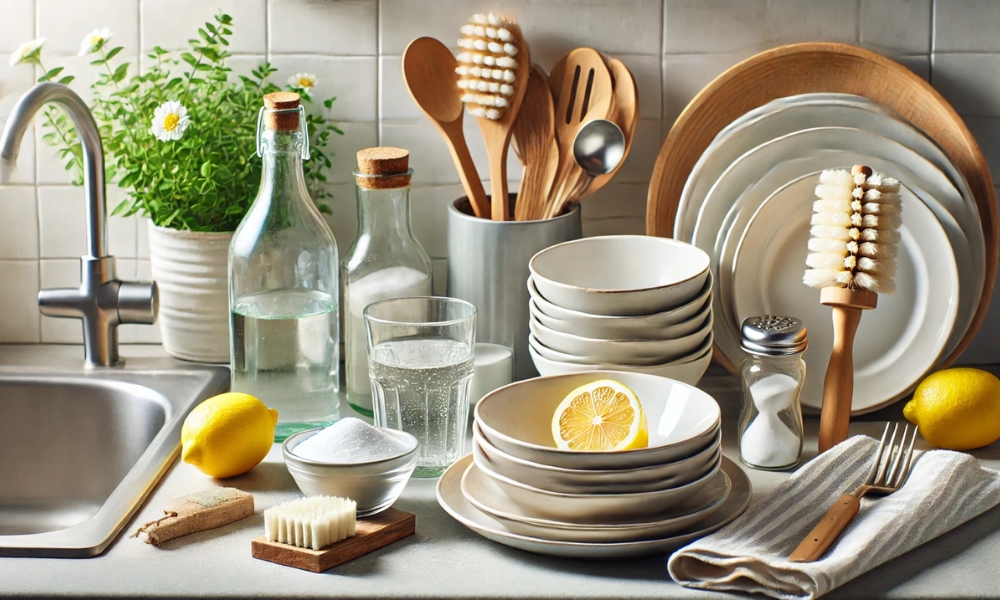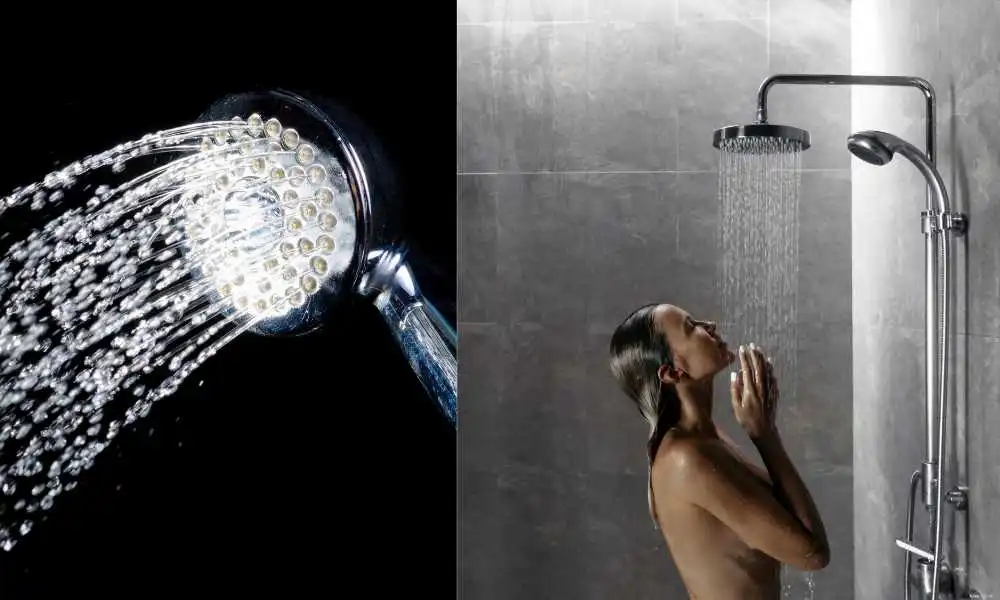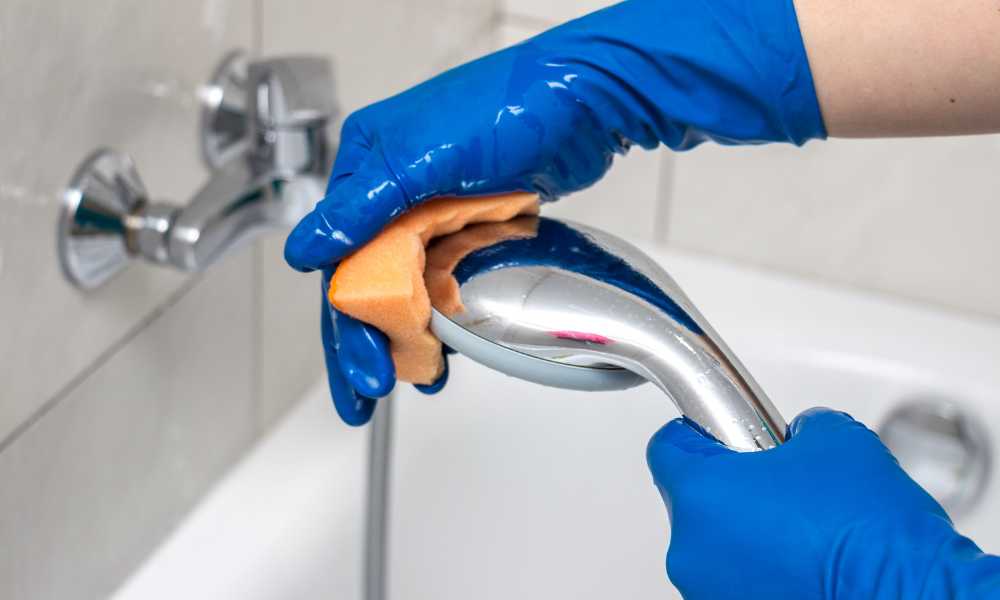Modern kitchens teem with an array of cleaning supplies, from detergents to scrubs designed to make dishwashing quick and effortless. The idea of clean dishes without soap is gaining traction, driven by a commitment to natural living and environmental mindfulness. Soap-free dishwashing may seem unconventional, but it opens the door to a fresh, eco-friendly approach to kitchen care. Removing soap from your cleaning routine also challenges you to adopt simpler, sustainable methods that can be just as effective with the right techniques.
How To Wash Dishes Without Dish Soap
Washing dishes without dish soap is simpler than it sounds, and it can be done effectively using a few natural alternatives. Start with hot water, which helps loosen grease and food particles, making scrubbing easier. Common household items like baking soda, vinegar, and lemon juice work wonders as natural cleansers—baking soda provides gentle abrasiveness, vinegar cuts through grease, and lemon juice leaves a fresh, clean scent. For tough spots, sprinkle a little salt or use a cloth with a scrubbing brush to lift stubborn residue. Rinse with hot water for a final touch, ensuring your dishes are spotless and chemical-free.
Benefits Of Dishwashing Without Soap
Using alternatives to traditional dish soap has a host of benefits. First, natural cleaning can reduce household expenses, as many soap alternatives can be sourced inexpensively or are already present in the kitchen. Soap-free cleaning can also be gentler on sensitive skin, eliminating potential irritants commonly found in commercial detergents. Embracing this method ultimately supports a greener lifestyle, reducing chemical runoff and packaging waste that impacts ecosystems.
Understanding The Impact Of Traditional Dish Soap On The Environment
Most commercial dish soaps contain synthetic chemicals and fragrances that are detrimental to the environment when they enter waterways. Phosphates, for example, can create algal blooms that disrupt aquatic life, while microplastics and sulfates contaminate water sources. Going soap-free prevents these pollutants from impacting our natural surroundings, offering a cleaner alternative that aligns with sustainable principles.
Exploring Natural And Eco-Friendly Alternatives
Without traditional soap, a variety of eco-friendly items can be used to effectively clean dishes. Natural alternatives such as vinegar, baking soda, and salt provide a powerful cleanse that’s free from harsh chemicals. These ingredients are biodegradable and safer for the environment, creating a sustainable cycle in which natural substances return to the earth without harm.
Gathering Essential Supplies For Soap-Free Dishwashing
Stocking up on soap-free cleaning supplies can prepare you for effective dishwashing without the use of detergents. Familiar household items, including sponges, cloths, and scrubbing brushes, are essential tools, especially when paired with natural ingredients. By selecting the right supplies, you can maximize the efficacy of each cleaning method.
Natural Items You Can Use Instead Of Dish Soap
Some of the most effective natural cleaners may already be in your kitchen. Baking soda, salt, vinegar, and lemon juice are all strong contenders. Baking soda acts as a gentle abrasive, salt as a natural scouring agent, vinegar as a degreaser, and lemon juice as a deodorizer. Each has unique properties that can tackle different types of grime and residue on dishes.
Tools For Effective Cleaning Without Soap: Sponges, Brushes, And More
Choosing the right cleaning tools can make soap-free washing simpler and more efficient. Sponges and brushes with coarse bristles aid in scrubbing away food particles, while microfiber cloths provide a soft surface for more delicate dishes. Bamboo scrubbers and coconut husk brushes are sustainable options that add power to the cleaning process without harsh detergents.
Using Hot Water As Your First Line Of Defense
Hot water is the simplest and most effective ally in soap-free dishwashing. Heat helps to break down grease and food residues, allowing for a more thorough clean. Running dishes under hot water or soaking them in a hot water bath can loosen tough grime, making it easier to scrub and rinse dishes to perfection.
The Power Of Scrubbing Techniques
Mastering scrubbing techniques is essential for successful soap-free dishwashing. Scrubbing in circular motions with moderate pressure can dislodge food particles, while applying extra force on areas with heavy buildup can ensure that all traces are removed. Using textured sponges or brushes with rough surfaces can maximize scrubbing efficiency.
Using Vinegar For A Sparkling Clean
Vinegar is a natural cleaner with acidic properties that dissolve grease and eliminate odors. Adding a splash of vinegar to hot water or using it directly on dishes allows for a thorough clean that leaves dishes gleaming. For glassware, a final rinse with vinegar can enhance shine and remove any lingering stains or odors.
Salt: An Unexpected Cleaning Ally
Salt’s gritty texture makes it an excellent abrasive for removing stubborn residues. By sprinkling salt on greasy pans or heavily soiled plates, you create friction that helps to lift grime. Salt also possesses slight antibacterial properties, offering an added layer of cleanliness.
Baking Soda For Mild Abrasive Action
Baking soda’s mild abrasiveness works well on tough stains without scratching dish surfaces. Sprinkling baking soda on a damp sponge or directly onto dishes creates a paste that scrubs away grime effectively. Baking soda also has deodorizing qualities that can remove unwanted odors from plates and utensils.
Lemon Juice For A Fresh, Clean Shine
Lemon juice is a natural cleaner known for its bright, acidic properties. It effectively cuts through grease and removes odors. Squeezing fresh lemon juice onto dishes or mixing it with hot water provides a natural shine and fresh scent. For extra cleaning power, use the lemon rind as a scrubber.
Using Ash Or Charcoal For Stubborn Grease
Ash and charcoal may seem unconventional, but their absorbent qualities make them powerful degreasers. Wood ash can be sprinkled on greasy surfaces and then scrubbed with a sponge, while finely ground charcoal absorbs oils. These methods are especially useful for cleaning cast iron and heavy-duty cookware.
Exploring The Benefits Of Boiling Water For Sterilization
Boiling water sterilizes dishes by killing bacteria and other pathogens, making it an ideal method for soap-free dishwashing. Submerging dishes in boiling water or pouring it over utensils is particularly effective for sanitizing and loosening residue. It’s a valuable step for those concerned about hygiene without using chemicals.
Steam Cleaning Method For Stubborn Residue
Steam offers a natural solution for dislodging tough, baked-on food. By creating steam from boiling water, you can soften residue and grime without extra effort. Placing dishes over a steaming pot allows the vapor to penetrate dirt, making it easier to wipe away.
Applying Olive Oil Or Coconut Oil For A Polish And Shine
Olive oil and coconut oil have natural cleaning properties that can polish and restore the luster of dishware. Rubbing a small amount of oil onto surfaces removes fingerprints, water spots, and grime, creating a smooth, polished finish. This technique works particularly well for wooden utensils and cutting boards.
Using Sand For Extra Abrasive Cleaning Power
Sand’s coarse texture is ideal for scrubbing away stubborn particles. This method is particularly handy when washing dishes outdoors or in camping settings. Sand can be sprinkled on pans or pots, then scrubbed to remove stuck-on food and burnt residues.
Employing Cloth And Rubbing Techniques
Using cloths, especially microfiber or cotton, provides a smooth, scratch-free surface for cleaning. Circular rubbing motions with damp cloths lift stains and grime. This method is perfect for glassware and ceramics, providing a streak-free shine without chemicals.
Rinsing Techniques To Ensure Clean Dishes
Rinsing is the final touch that ensures every trace of residue is removed. Running dishes under hot water helps remove any remaining particles, leaving a fresh and spotless surface. For dishes cleaned with baking soda or vinegar, an additional rinse prevents any lingering odors.
Drying Dishes Without Streaks
Drying dishes properly prevents water spots and streaks, especially on glassware. Air drying is a gentle method, but using a clean microfiber towel offers a faster, streak-free result. Hand drying also adds an extra polish, keeping dishes spotless and ready for storage.
Keeping Your Sink Clean And Ready For Next Time
Maintaining a clean sink ensures each wash is effective. Rinsing and wiping down the sink with vinegar or hot water prevents food particles from accumulating. Keeping your sink fresh between washes supports a soap-free routine by creating a clean space for each dishwashing session.
Benefits Of Using These Methods In Outdoor Kitchens And Camping
Soap-free cleaning methods are perfect for outdoor kitchens and camping, where natural resources may be limited. Vinegar, lemon, and sand are ideal alternatives that reduce the need to pack extra supplies. Soap-free washing minimizes environmental impact in natural settings.
Creative Natural Alternatives For Extra Dirty Dishes
For particularly dirty dishes, combining several natural ingredients, such as salt and vinegar, or using a mix of baking soda and hot water, can enhance cleaning power. These combinations provide an extra boost for heavily soiled plates or greasy cookware.
Maintaining Dish Hygiene Without Soap Over Time
Regularly following these soap-free methods can ensure long-term hygiene. Incorporating natural cleaners into your daily routine reduces reliance on chemicals, keeps dishes fresh, and fosters a more sustainable lifestyle.
Conclusion
Choosing to clean dishes without soap transforms the act of dishwashing into an environmentally conscious practice. This approach not only benefits the planet but also enriches personal routines with simpler, natural alternatives. By adopting these methods, you can create a lasting, positive impact that supports a cleaner kitchen and a healthier home environment.


